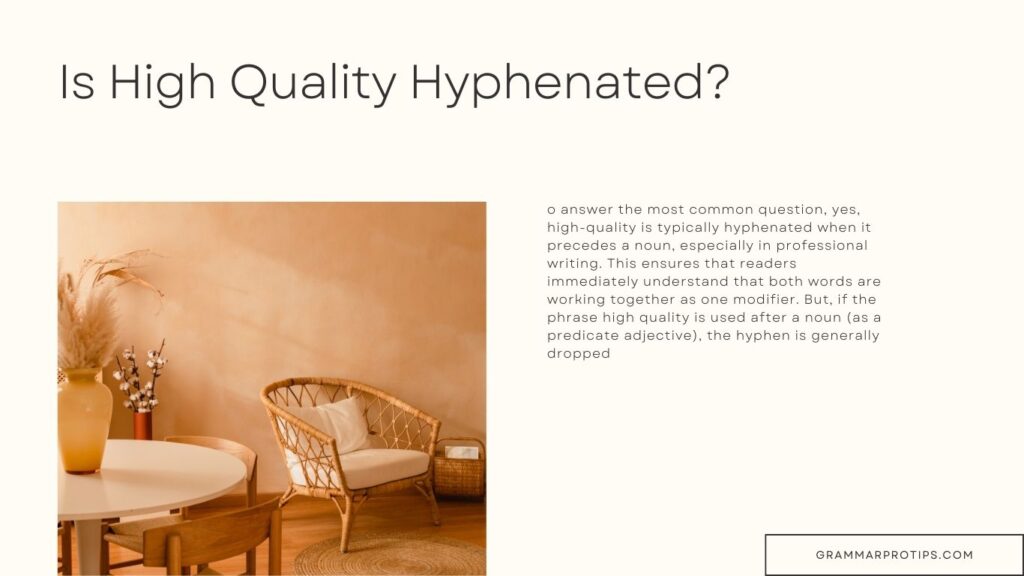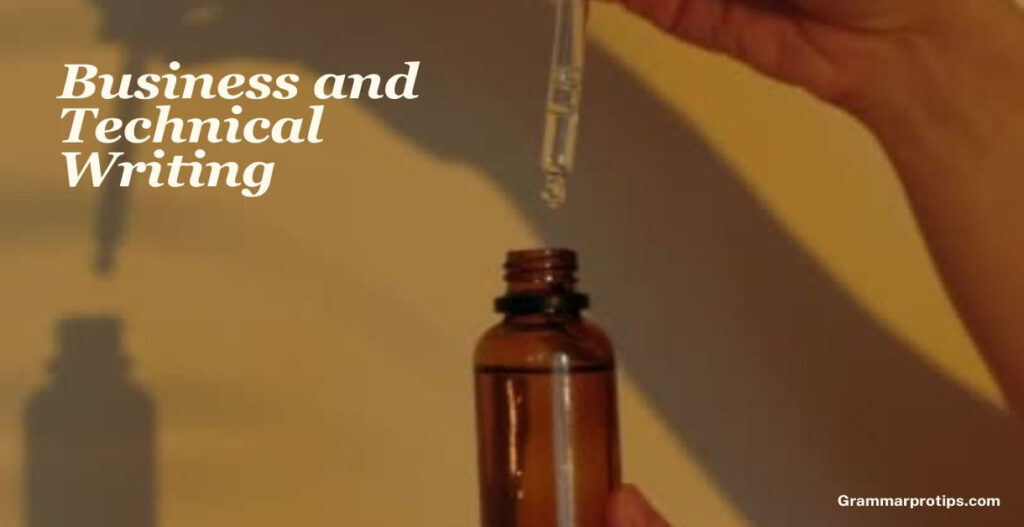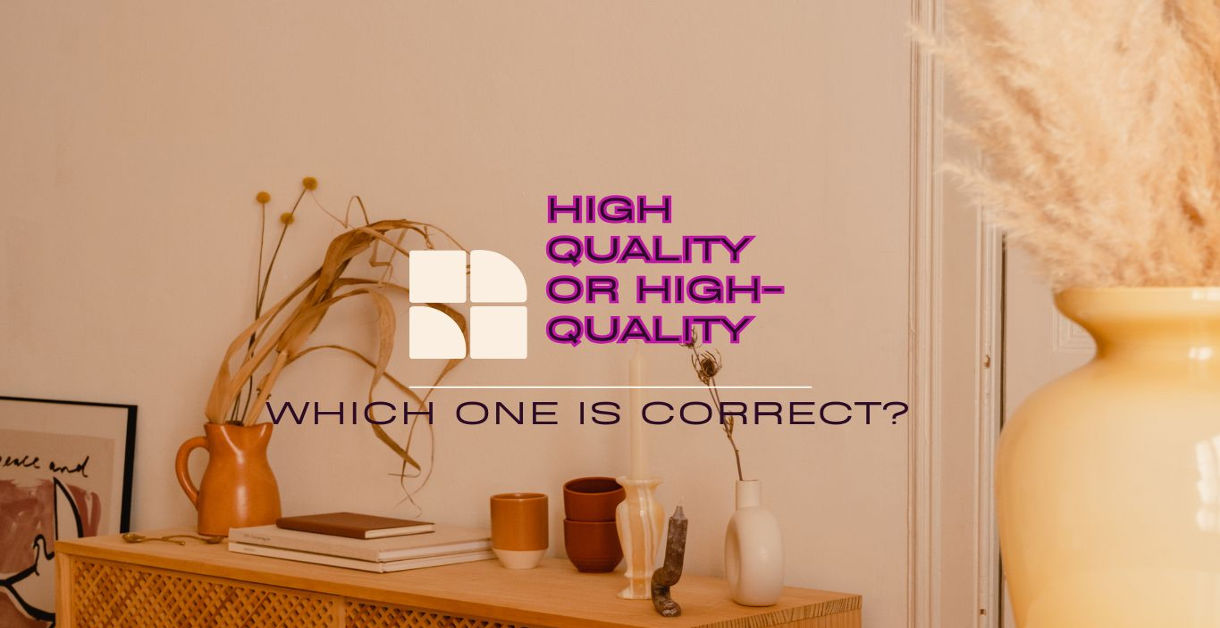In the world of writing, punctuation can be a tricky beast to tame. The question of whether to use high quality or high-quality is one that often arises, especially for writers in professional and technical fields.
This small decision can impact the clarity and professionalism of your writing. But which is the right choice? Let’s break it down and explore the grammar, rules, and nuances that can guide you in making the best choice for your writing.
Understanding Compound Adjectives
Before delving into whether high quality should be hyphenated, it’s important to first understand the role of compound adjectives in English. A compound adjective is made up of two or more words that work together to describe a noun. For example, in the phrase “a high-quality product,” the two words “high” and “quality” come together to form a single descriptive unit that modifies the noun “product.”
In this case, high-quality acts as a hyphenated compound adjective. Hyphenating compound adjectives is a rule in English grammar used to maintain clarity. Without the hyphen, the meaning of the phrase could become ambiguous or unclear. However, the question arises: when exactly do we use the hyphen?
Is High Quality Hyphenated?

To answer the most common question, yes, high-quality is typically hyphenated when it precedes a noun, especially in professional writing. This ensures that readers immediately understand that both words are working together as one modifier. But, if the phrase high quality is used after a noun (as a predicate adjective), the hyphen is generally dropped.
Example 1:
- High-quality products are always in demand. (Here, “high-quality” modifies “products.”)
- The products are of high quality. (In this case, no hyphen because “high quality” follows the noun.)
By placing the hyphen between high and quality, we show that the two words work together as a single unit to describe the noun. This helps to maintain writing clarity.
Should High Quality Be Hyphenated?
When you see high-quality used to describe a noun, the rule of thumb is to hyphenate it. Without the hyphen, it could create confusion, especially in business and technical writing. The hyphen in high-quality care or high-quality service signals that the quality of the care or service is superior, rather than two separate descriptors.
Example 2:
- High-quality care is essential for patient satisfaction. (Clear, concise, and professional.)
- The care provided is of high quality. (No hyphen because it follows the noun.)
High Quality Hyphen or Not?
It’s crucial to remember that hyphenation rules often depend on where the adjective appears in the sentence. If high quality is used after the noun, then no hyphen is needed.
Example 3:
- She provides high-quality customer service. (Before the noun = hyphen)
- The customer service is of high quality. (After the noun = no hyphen)
But when the phrase acts as a modifier before a noun, the hyphen helps maintain precision in writing and grammar usage.
The Role of Adjective Modifiers
In English grammar, adjective modifiers like high-quality can be essential for precision in writing. Without them, the intended meaning might be lost or confused. For instance, high quality alone could be interpreted as a noun phrase, whereas high-quality makes it clear that the adjective is modifying the noun.
High Quality or High-Quality: The UK Perspective
In both UK and US English, high-quality is typically hyphenated when it precedes a noun. However, there may be slight regional differences in style guides. In the UK, high quality may sometimes appear without the hyphen, but this is more likely in informal or journalistic writing. In more formal or business writing, the hyphen remains the preferred form.
Example 4 (UK):
- We deliver high-quality services. (Common in business and technical contexts in the UK)
- Our team is known for its high quality of work. (Less common, but may appear in certain contexts)
High Quality Synonyms
For variety and clarity, it’s often a good idea to switch up your word choice. Here are some high-quality synonyms you can use to avoid repetition:
- Excellent
- Superior
- Top-notch
- Premium
- Outstanding
- First-rate
These alternatives can help elevate the tone of your writing without over-relying on the phrase high quality.
High-Quality Work Synonym

In professional writing, especially in a business context, it’s important to vary language for engagement. Instead of high-quality work, try using terms like exceptional work, outstanding performance, or superior output. This keeps your communication fresh and avoids sounding monotonous.
Example 5:
- Our team consistently delivers high-quality work.
- Our team consistently delivers exceptional work.
The Importance of Clarity in Compound Adjectives
When constructing your sentences, clarity is essential, especially when it comes to compound adjectives. The hyphen helps convey your message more effectively, ensuring the reader doesn’t misinterpret your words.
For example, consider the difference between:
- A high-quality education.
- A high quality education.
Without the hyphen, the second phrase could make it seem as if high and quality are separate, when in reality, they should work together as a compound adjective to describe the education.
Grammar and Writing Precision
Whether you’re crafting a professional email, product description writing, or business report, grammar and writing precision are key. Hyphenated compound adjectives like high-quality keep your writing clear and precise, reducing the chances of ambiguity. This is especially important in technical writing and product descriptions where clarity is essential.
Proper Hyphenation in English
Hyphenation in English isn’t always straightforward, and knowing when to use a hyphen can be tricky. However, by following basic noun phrase structure and adjective-noun modifiers, you’ll have a much easier time understanding when high-quality needs a hyphen.
Non-Hyphenated Adjectives
Some adjectives don’t require a hyphen, especially when they appear after the noun they modify. These include adjectives like cold weather, fast car, and big house. However, as a rule, compound adjectives like high-quality and well-known typically require the hyphen when placed before a noun.
Noun Phrase Construction
To help solidify these concepts, let’s break down a noun phrase structure:
- High-quality products: “High-quality” is the adjective modifying the noun “products.”
- The products are high quality: “High quality” is used as a predicate adjective after the noun, so no hyphen is needed.
This is a common issue in professional communication in business and technical writing, where precision is critical.
Business and Technical Writing: Hyphenated Compound

In business communication, especially in professional emails or product description writing, hyphenated adjectives like high-quality help ensure the meaning is clear. Consider the following professional email examples:
Example 6 (Professional Email):
Subject: Product Quality Update
Hi Emily,
I hope you’re doing well. I wanted to provide an update on the high-quality products we’ve received from our suppliers. The items are meeting our high-quality standards, and we expect to move forward with the next phase of our project.
Please let me know if you need further details.
Best regards,
John
In this case, high-quality is used before the noun, and the hyphen helps keep the message clear and precise.
Example 7 (Product Description Writing):
Premium Home Furniture Collection
Our high-quality furniture is designed to offer you the best in comfort and style. Crafted with care and attention to detail, every piece in our collection promises long-lasting durability and outstanding performance.
In these examples, using the hyphen in high-quality adds clarity and professionalism, which is key in business writing.
Table of Hyphenation Rules
| Scenario | Hyphenated | Not Hyphenated |
|---|---|---|
| Adjective before a noun | High-quality | High quality |
| Adjective after a noun | High quality | High-quality |
| Formal or technical writing | High-quality | High quality |
| Informal or journalistic style | High quality | High-quality |
Conclusion: High Quality vs. High-Quality
To summarize, when deciding whether to use high quality or high-quality, it’s important to consider the context. In professional writing, technical writing, and product descriptions, high-quality is typically preferred when it precedes a noun. Dropping the hyphen is acceptable when the phrase follows the noun.
Using proper hyphenation in English isn’t just about grammar—it’s about writing clarity. Hyphenated adjectives like high-quality reduce ambiguity and ensure your writing is professional, clear, and precise. So, next time you’re deciding whether to use a high-quality product or a high quality service, remember that a little punctuation can make all the difference!

“Smith is the dedicated admin of [grammarprotips.com], a platform focused on enhancing grammar skills. With a passion for language and education, Smith strives to make grammar accessible and enjoyable for learners of all levels. Committed to delivering high-quality content, Smith continually explores innovative ways to help users master the complexities of grammar.”

